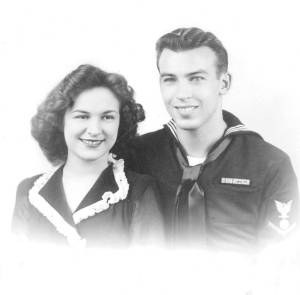The World War Two Memorial
I was back in Washington, D.C. last week and had the privilege of visiting the World War Two Memorial there. If you haven’t visited it before, it’s an impressive site, although I had the kind of mixed feelings that regularly plague me on such locations. I can’t help but think we should visit such places in quietness and contemplation. One of the prominent inscriptions on the memorial is from one of my sailor father’s heroes, Admiral Chester Nimitz:
They fought together as brothers-in-arms. They died together and now they sleep side by side. To them we have a solemn obligation.
And yet there was very little solemnity around me as I walked around the memorial. The memorial is ringed by two semi-circular walls on which the names of the major battles of the European and Pacific theaters are inscribed, and when I got to the two words “LEYTE GULF”–the battle in which my father’s destroyer was sunk by Japanese suicide bombers–I found it hard to swallow, and for a moment, difficult to see. And yet all around me there were children laughing and playing, teenagers eating hot dogs and taking selfies, and tired parents resting on the names of battles at which Americans had died. If an experience can be inspiring and depressing simultaneously, this one was.
“Monuments Without Inscriptions”
All of which has got me to thinking about a different kind of WWII memorial, namely the dwindling number of surviving WWII veterans. Roughly 97 percent of those who served our country during World War Two are now gone. Many who are still with us are past sharing about their experiences, and many never wished to.
In writing this I am reminded of one my favorite books by one of my favorite authors: Hannah Coulter, by Wendell Berry, the prolific Kentucky novelist, poet, and essayist. Like many of Berry’s novels, Hannah Coulter is set in the tiny fictional hamlet of Port William, Kentucky. Narrated through the reminiscences of an aged farm wife, the novel spans the period from the Great Depression through the close of the twentieth century, but the emotional heart of the novel grapples with the personal effects of the Second World War.
Toward the end of her recollections, Hannah relates that she “married the war twice, you might say, once in ignorance, once in knowledge.” She married her first true love, Virgil Feltner, just weeks before the Japanese attack on Pearl Harbor. Virgil entered the army in 1942 but didn’t come home, falling at the Battle of the Bulge. In 1948 she married another local GI, Nathan Coulter. Nathan came home physically unscathed, but forever marked by what he had experienced.
Hannah’s reflections about her second husband remind me of my own father’s unwillingness—or inability—to share about his wartime experiences. As I have noted before, my dad saw extensive action in the South Pacific from 1942-1944. On the third anniversary of Pearl Harbor, his destroyer, the U.S.S. Mahan, was hit by three Japanese Kamikaze suicide bombers off the coast of the Philippines and sunk. Dad has always been willing to share this much, but no more. What he felt when he heard the crash of the Kamikazes, what he thought when the forward magazine on the Mahan exploded, what he saw as he headed toward the side, what went through his mind when he jumped into the oil-coated bay, what, perhaps, he prayed as he bobbed in the water while the battle continued to rage—these are things that Dad never once offered to share.
And so I was deeply moved to read Hannah’s reflections on Nathan’s half-century-long silence:
He did not talk about it, I understood, because it was painful to remember; and for the same reason I did not ask him about it. . . . Nathan was not the only one who was in it, who survived it and came home from it and did not talk about it. There were several from Port William who went and fought and came home and lived to be old men here, whose memories contained in silence the farthest distances of the world, terrible sights, terrible sufferings. Some of them were heroes. And they said not a word. They stood among us like monuments without inscriptions. They said nothing or said little because we have barely a language for what they knew, and they could not bear the pain of talking of their knowledge in even so poor a language as we have.
Are there “monuments without inscriptions” in your life today? Reach out to them while you can.





